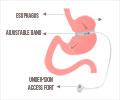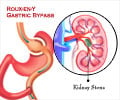Laparoscopic Roux-en-Y gastric bypass is an effective treatment for morbid obesity, but might aggravate gastrointestinal complaints and food intolerance.

- Patients undergoing Laparoscopic Roux-en-Y gastric bypass (LRYGB) for morbid obesity have more gastrointestinal complaints than those who don’t undergo the surgery.
- Food intolerance is a common side-effect of LRYGB //independent of the presence of other abdominal symptoms. Laparoscopic Roux-en-Y gastric bypass (LRYGB) is an effective treatment for weight loss in obese patients, but a new study finds that patients who undergo the surgery often complain of gastrointestinal problems. Surgical patients often experienced indigestion. Also, food intolerance, especially for food with a high fat or sugar content and for red meat, was a common side-effect of the surgery.
- Berlage T.C.C. Et al., Gastrointestinal symptoms and food intolerance 2 years after laparoscopic Roux-en-Y gastric bypass for morbid obesity, British Journal of Surgery (2016), http://dx.doi.org/10.1002/bjs.10419.
- http://bariatric.surgery.ucsf.edu/conditions--procedures/laparoscopic-gastric-bypass.aspx.
Food intolerance for specific products was reported by 70.7 percent of postoperative patients compared with 16.9 percent of controls.
Laparoscopic Roux-en-Y gastric bypass operation, usually performed laparoscopically, involves making five to six small incisions in the abdomen through which a small scope connected to a video camera and surgical tools are inserted.
The surgeon staples the top portion of the stomach so it is separated from the bottom to create a small stomach pouch. This small pouch restricts food intake. A section of the small intestine called the jejunum is then attached to the small stomach pouch permitting food to bypass the lower stomach, the duodenum. This bypass reduces the amount of calories and nutrients the body absorbs.
"Most studies in weight loss surgery focus on the short-term effects of surgery, and there was limited knowledge about the effect of a gastric bypass on gastrointestinal complaints in the long term," said Dr. Thomas Boerlage, lead author of the British Journal of Surgery study.
Reference















